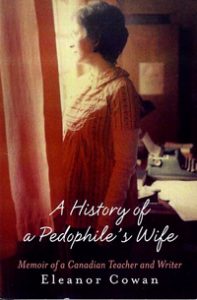 By Eleanor Cowan
By Eleanor Cowan
With a sparkling wedding ring on my finger, I’d claimed a much-desired new identity – no longer the binge-drinking daughter of an alcoholic mother who’d taken her own life, no longer the thrice-raped young woman drowning in shame, but instead newly married to a handsome, highly educated university student. I’d begun a whole new chapter of life.
Still, I noticed things. Little things that I dismissed. That summer of 1973, after my regular work hours at the library, I waitressed part time for the extra cash to pay for my fall university courses in Paris. While I noted my husband’s five-year high stack of unpaid student loans, I decided that his finances were none of my business.
“One thing I admire about you,” said Stan one evening, “is your pleasantness. Everyone likes you.” He smiled at me before lowering his head. “Whereas for myself,” he added, “I guess I sound complicated to most ordinary folk. I’ve been studying for so long, I’ve lost that simplistic touch, that down home manner.” There was something about that comment that irked me, but, thrilled that we’d both soon be off to school in Europe, I brushed it off.
“If the Loans and Bursaries Department can manage to do their jobs properly, my student loan money will arrive soon,” Stan said. When the funds hadn’t yet been approved and flights needed to be booked, I offered to help until Stan’s his newest loan kicked in.
“Two flight tickets paid. Three months advance rent on our student residence – paid. Enough for groceries too,” I proudly announced the day before Stan was fired from a library job I’d secured for him through a work contact.
So far, I’d never seen my husband so angry. He railed at being unfairly terminated by a demanding librarian who insisted work be done according to her finicky-precise directions. Stan said he’d shown his new boss a more efficient technique to proceed and her reaction was offensive. Stan’s dismissal came two weeks before our departure and, since I had no idea what happened, I let it go.
When the telephone company called twice in one week to say they’d traced to our phone number a barrage of threatening calls to the woman who’d fired him, Stan swore on the bible that the phone company got their wires crossed. After all, I’d called him at the library using our phone, hadn’t I? I believed him. Off we flew to study in beautiful Paris. So exciting.
Every day of our first four months in Europe, I checked the mailbox in our student residence. No cheque. Tension mounted. I asked Stan for his application papers so that I could refer to them when I called Canada. Oh no, they seem to have been lost – not only by Stan, but by the Government Loans Department who claimed they’d never received them. It was exam time and Stan said he was overwhelmed about the tests to come. I offered to quit my classes. I offered to find a job. I could always study later.
“My family thinks the world of you, Eleanor,” Stan said. “You handle distress like a queen, you’re forgiving about the lost loan papers and you’re not letting me down. I married the right woman.”
I found three part-time jobs in three different locales at which I remained for the rest of our stay. With no more talk about the missing forms or any other financial aid, we relied completely upon my salaries.
I worked twelve-hour days, leaving our room in the early morning and returning just in time for the evening kitchen meal with the other students. One evening, there was a bus jam and I missed supper. The kitchen had closed – but after eating his meal, Stan forgot to bring a plate for me. “I’ve so much on my mind!” he said. “You’ve no idea! I can’t believe you’re actually angry with me about food!”
I said I understood – but I didn’t. I knew in my heart I’d have brought Stan a good meal. Since we could store only dry food in our rooms, I munched on crackers and went to bed. It would be okay. I calmed myself, but when it happened again, and I wept to a new friend down the hall, I was told that I’d married an ‘absent minded professor’. She counseled I let it go. “It’s only a minor detail” she said. “Don’t make a big mountain out of a tiny molehill.”
One afternoon, I received a letter from a former colleague at the library who said that a barrage of anonymous letters deposited in the book returns box threatened harm to Stan’s former boss and that the librarian’s terrified mother insisted she quit her job and return home immediately.
“See,” said Stan. “Obviously, I couldn’t have sent mail from here, or the post mark would have condemned me, but, not surprisingly, she’s attracted another enemy.” It was his lack of dismay and his use of the words ‘another’ that made me wonder. Was Stan her enemy too? Had he got someone to hand deliver the threats for him? I soon felt shame at my strange suspicion of my husband.
The following day, at a celebration for one of the staffers at one of my workplaces, I was warmly welcomed to a delicious lunch with lovely people – who hoped I’d stay in Paris for years to come. I felt so grateful and happy. I also drank too much and arrived home looking drunk.
“You terrify me,” said Stan. “Do you want to die of alcoholism like your mother? I thought I could count upon you to conduct yourself with integrity!” Filled with remorse, and confusion, I vowed to become a better person. It was all my fault. All my minor suspicions paled in the face of my own disgrace.
The following day, Stan shared his tremendous anxiety about his student loan repayment schedule now due. I offered to start making the payments which he very gratefully accepted. After all, I had to redeem myself. I had to restore peace, equilibrium and my self-respect.
Eleanor Cowan is author of “A History of a Pedophile’s Wife,” which is available on Amazon.com. Visit her at eleanorcowan.ca.




































 Maybe this tune should be the ‘Sociopath Song’?
Maybe this tune should be the ‘Sociopath Song’?
goodmorninglove
Wow, Donna. This experience was horrendous to read; I can’t imagine living it. I am so glad you not only survived it, but used it as fuel to create this site which is helping so many to recognize what they are truly up against. You do so much good that you’ll never know. Thank you for transforming your pain and trauma into the power of wisdom for others.